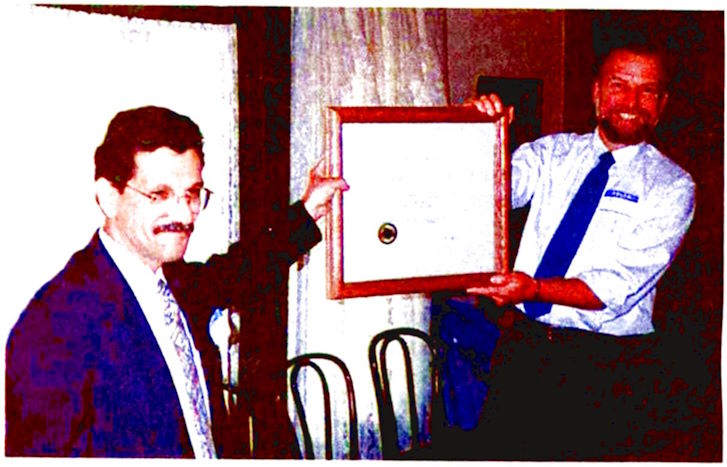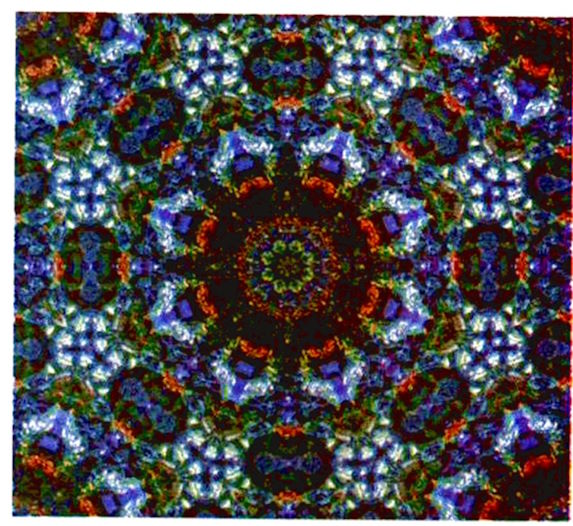© 1997 The Fellowship for readers of The Urantia Book
| Three Rs: Relationship, Religion and Revelation | Winter 1997 — Vol. 6 No. 9 — Index | News from Colombia |
¶ Trustees and Five Exec Committee Members Meet
In an attempt to bridge a gap in communications that has troubled the Urantia movement for nearly a decade, the four Foundation trustees and five members of the Executive Committee of the Fellowship met recently. The daylong meeting occurred at the headquarters of Urantia Foundation in Chicago on Saturday, January 11, 1997.
Fellowship President Steve Dreier, Marilynn Kulieke, Gard Jameson, Harry McMullan and Mo Siegel attended the meeting in an informal capacity. The Foundation trustees at this time are President Patricia Mandelius, Thomas Burns, Georges Dupont, and Richard Keeler. They currrently have an opening on their board due to the recent resignation of Phil Rolnick.
Matters covered at this landmark meeting include discussions of possible joint projects. The trustees agreed to refer new readers of The Urantia Book to study groups listed in the Fellowship’s study group directory.
“The meeting was friendly and anxiety free,” says Steve Dreier. “We spent a great deal of time getting to know one another and stayed away from discussing issues of the past. We dealt with things affecting the present or future.”
A meeting between the Executive Committee and trustees is in the process of being scheduled. It will be a formal meeting.
¶ Wisconsin Forms a New Fellowship Society
Leaders and members of the First Wisconsin Society for Readers of The Urantia Book celebrated the fruits of their labors at an installation luncheon meeting, Saturday, September 14, 1996. Over 30 members and well-wishers gathered in Sheboygan Falls to witness bestowal of the charter by Fellowship Charter committee chairman, Avi Dogim. Accepting was newly elected society president, Robert Arkens of Wausau, Wisconsin.
Eleven founders and 14 charter members make up this, the 24th group to be chartered as a society of the Fellowship. There are 19 active societies at present, with five others having either disbanded or aborted before installation.

Besides Dogim, Fellowship president Steve Dreier and John Hales, resident director of the Chicago headquarters office, spoke words of congratulations and added a historical perspective to the event.
Fellowship societies have taken many forms in the 40 years since the first society, namely, First Urantia Society (Chicago), was chartered. Early societies grew out of single study groups started by inspirational teachers or by leaders with organizational ability. One society (no longer in existence) formed itself with research as its sole activity.
More recently, new societies have come into existence at the urging of leaders of several study groups in a state (or country) who want to flex their organizational muscles. Society status provides a voice in the official Fellowship organization.
Mark Kulieke, Green Bay, who, besides Arkens, was a leading force behind the First Wisconsin Society’s organization, describes the group as composed of individuals from six groups around the state: Green Bay, Madison, Sheboygan Falls, Clintonville and Door County. For the past 10 years these groups have organized summer retreats, campouts, seminars, and regional conferences, including the perennial Midwest Conference.

¶ News from the International Fellowship Committee
The International Fellowship Committee met in Cliffside Park, New Jersey, December 14, 1996. John Lange, chairman of the committee, and members Lila Dogim, Adrienne Jarnagin, Susan Ransbottom and Stevie Shaefer attended. They were joined by new adjunct members Kay and Barry Clark, Lee Colbert, Gary Deinstadt and Bobbie Dreier. The agenda included reports on international activities in 1996 and plans for the future.
It was reported that Urantia Book readers from 18 nations joined with over 1,000 attendees at IC96. Members of the international community gave daily presentations. The conference featured the Berkeley Elliott International Lounge, a Spanish-English bilingual workshop each day, pre-conference translation of some presentations and simultaneous translation of small groups where possible. Also available were videotapes of plenary talks, informal “buddies” and many opportunities for international guests to meet and share experiences about the study of The Urantia Book in their native countries.
Members of the committee have made several international visits this year. They traveled to Russia, Lithuania and many Latin American countries. In addition, the Fellowship sponsored a booth at the Singapore Festival of Books.
Interested individuals and societies are doing translation projects in Russian, Korean and SerboCroatian. As a result of reader support of translations the Fellowship has decided to formalize translation activities with a committee.
IFC members continued personal contact with international friends by phone and e-mail. All readers who have friends in the international community are encouraged to maintain their correspondence.
The following plans were made:
- A committee to facilitate international services at conferences was formed.
- A Spanish Web page will be created to assist international communication and networking among the Spanish-speaking community.
- The Fellowship will attend book fairs in Korea, Singapore and India.
- The international “library book placement” project will be renewed.
- A committee to coordinate efforts in Latin America was formed.
- IFC will have an open meeting at the Summer Study Session in Vancouver in July. Those interested in helping to foster our global mission to the revelation are welcome to attend.
¶ Heart of America Society Holds Workshop
The Heart of America Society held a one-day workshop on the campus of Park College on the bluffs overlooking the Missouri River Valley in Parkville, MO near Kansas City on October 19, 1996.
With the topic of “Leaps of Faith,” the workshop asked this question: Does The Urantia Book give us information that helps us make leaps in our faith? Does it help answer the faith questions asked by children?
“Only a personality can know what it is doing before it does it; only personalities possess insight in advance of experience. A personality can look before it leaps and can therefore learn from looking as well as from leaping.” (The Urantia Book, 16:7:3)
David Kantor’s presentation focused on the challenges the Russian people face in the reconstruction of their religion after 70 years of religious persecution. Rebecca Kantor reviewed James Fowler’s stage theory of development of faith, drawing on development work done by Erikson & Piaget, and correlated it with some of the things The Urantia Book has to say about the various stages of our faith experience. By considering an overall gradient, we can hopefully gain some insight into our own progress and understanding of some of the tasks ahead of us.
¶ General Council Approves Affiliate Standing
The General Council of the Fellowship met in August 1996 and approved a proposal to develop an alternate membership category for reader groups who desire to affiliate with the Fellowship but do not wish to become a society. Affiliate requirements are less demanding than those required for chartering a society. Affiliated groups will not participate in the Triennial Delegate Assembly, which is composed of representatives of Fellowship societies. These delegates formally elect individuals to the General Council and submit resolutions for consideration by the General Council.
One such TDA resolution concerned reformations to the structure of the General Council, which would provide the right for each society to directly elect a councilor from its group. Potentially, the General Council could have expanded from 36 to 55 members. The proposal, under consideration for more than five years, was voted against at this meeting of the General Council. The proposal had been discussed at several meetings of the General Council and at society conclaves, and was the subject of many reports and position papers.
The General Council elected the following individuals to committee memberships: Judicial, Steve McIntosh, six years; Charter, Bob Bruyn, six years; Fratemal Relations, Gard Jameson, six years and chairman; Domestic Extension, Mo Siegel, six years and chairman; International Fellowship, Susan Ransbottom, six years; Education, Michelle Klimesch, six years, and Patrick Yesh, one year; Publications, Carolyn Kendall, six years; Finance, Steve Wilsey, six years; and Special Projects, Barbara Newsom, six years.
| Three Rs: Relationship, Religion and Revelation | Winter 1997 — Vol. 6 No. 9 — Index | News from Colombia |